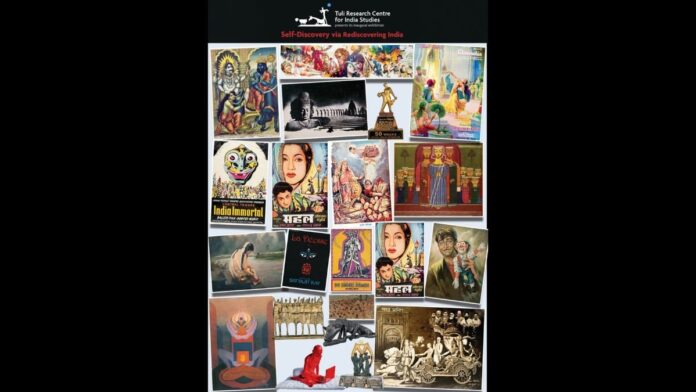15th to 30th March 2024 at the India International Centre GalleryMax Mueller Marg, New Delhi 110003 | 11 am to 7 pm daily
New Delhi (India) March 15: The exhibition – “Self-Discovery via Rediscovering India” – presents the vision and selects highlights of the vast domain of India Studies through original and digitised artworks, artifacts, archives, and memorabilia from the Tuli Research Centre of India Studies (T.R.I.S.) founded by Neville Tuli. This Exhibition primarily focuses on the fields of Indian and World Cinema, Modern and Contemporary Fine and Popular Arts & Crafts, Photography, Architectural Heritage, Animal Welfare, Ecological Studies, and the Social Sciences.
Hundreds of research materials and art works are coherently integrated into an exhibition space which tries to express the vast and chaotic energy and rhythms so grasping the soul of one of the world’s greatest civilizations, where six thousand years are still clearly living and breathing in the modern and contemporary.
This Inaugural Exhibition draws on materials belonging to a single vision and collection that positions the contemporary as a living form of the ancient-medieval-modern continuum.
After a three-decade long pioneering journey and sustained search dedicated to the building of cultural institutions and their infrastructure in India, Neville Tuli will publicly share his knowledge and learning-base rooted in the arts, cinema, and their related disciplines, which finally becomes available online and offline to the world with the launch of the Research Centre and its website.
The Archives and Library which are the backbone of this Research Centre will be introduced to India through exhibitions, seminars, workshops, and conferences over the next three months, opening out a conceptual framework and curricula for the first of its kind three-year undergraduate programme for Contemporary India Studies across the world.
The critical need to meaningfully reach the arts and culture to the masses and public, not just the elite and aspirational, must be taken to the next level. Creating an India Studies educational framework is the ideal way to take this vision forward.
“The exhibition introduces one’s vision to reach out freely step by step, wide and deep, to our people, and carry to them a holistic glimpse into the heart, mind and soul of India. It is structured on three levels – the physical object, the archives, and the digital formats – and rooted within the ground and context of sixteen Research Categories which structures the India Studies framework, which my thirty years of understanding India at both theoretical and practical levels has evolved” states Neville Tuli.
Research Categories for India Studies | 2024-2026
1. Cinema as a critical Educational Resource | CinemaE
2. Modern and Contemporary Fine Arts | FineArts
3. Photography in India | Photography
4. The Printed Image, Popular Arts and Crafts | PopCult
5. India’s Architectural Heritage and its Inspiration | ArcH
6. The Economics of Art, Cinema and Culture | EconArts
7. Automobile, Transport, and Travel Heritage | Travel
8. Uncertainty: Mystery * Magic * Horror * Sci-Fi * Gambling | Uncertainty
9. Social Responsibility of the Creative Mind | SocialR
10. The Changing Smile of Childhood | Childhood
11. The Erotic Discipline within Creativity | EroticD
12. The History and Historiography of Scholarship in the Arts | Scholarship
13. Seeking Justice and Political Integrity | JusticeP
14. India and her Relationship with the World | IndoWorld
15. The Religious-Spiritual-Poetic-Philosophical Framework | RSPPC
16. The Animal-Human-Nature-Cosmic Continuum | Continuum
These sixteen Research Categories together create the base for the India Studies framework conceptualised by Neville Tuli. Together with the 40,000+ Masterlists, they will create the foundation for the new educational knowledge-base which will be shortly shared on www.tuliresearchcentre.org.
The Exhibition is curated mostly from the first four Core Research Categories are artworks, artifacts and archives focusing on the following select primary Master-Lists which together straddle and share ideas and insights across all sixteen Research Categories:
1. CinemaE
E.g. the Song-Synopsis Booklets; the Jubilee Trophy; the International Film Festival Catalogue Covers; German Expressionism; Comedy & Horror from the silent era of Hollywood; Hollywood handbills of films released in Indian cinemas; with focus on Thomas Edison, Roscoe ‘Fatty’ Arbuckle, Charlie Chaplin, Buster Keaton, Tod Browning, Lon Chaney, Fritz Lang, Thea von Harbou, with films such as Light of Asia, The Last Laugh, Metropolis, Dracula, Freaks, Mahal, Pather Panchali, Mughal-e-Azam, Ganga Jamuna, Pakeezah, Deewaar, Kranti; archives of Satyajit Ray; vintage postcards and Lobby Cards; Himanshu Rai, Balraj Sahni, Chidananda Dasgupta, Dilip Kumar, Raj Kapoor, Amitabh Bachchan & Manoj Kumar, among others.
2. FineArts
E.g. Kashmir, the Dog and Animals Animated in Art, Life of Christ, Swami Vivekananda, Rabindranath Tagore, Gaganedranath Tagore, Nicholas Roerich, Jamini Roy, Chittaprosad, D.P. Roy Chowdhury, M.F. Husain, F.N. Souza, K.G. Subramanyan, Ganesh Pyne, J. Sultan Ali, Jyoti Bhatt, K. Laxma Goud & G.R. Santosh; the Children’s and Illustrated Book Tradition – from Abanindranath Tagore to Namrita Bachchan.
3. Photography
E.g. the Himalaya, Felice Beato, Samuel Bourne, Lala Deen Dayal, Henri Cartier-Bresson, R.R. Bharadwaj, Raghu Rai, Madan Mahata, Ketaki Sheth, Architectural Heritage of India, among others.
4. PopCult
E.g. Political Propaganda featuring Mahatma Gandhi, Netaji Subhas Chandra Bose, Pandit Jawaharlal Nehru, the INC, RSS, IPTA; Advertising featuring Travel & Pilgrimage, including Bodh Gaya, Chittor, Aurangabad, Goa, Sanchi, Lucknow, Delhi, among others.
Hopefully this Exhibition will kick-start the critical movement of taking India Studies into every School and University as a specialised subject and begin to once and for all rectify the vast inequality which riddles the Indian educational framework where the arts, cinema and culture are not taught in any manner which allows them to be seen and understood as part of daily life where the creative spirit in all of us is nurtured with the deep respect it fully deserves.
If you have any objection to this press release content, kindly contact [email protected] to notify us. We will respond and rectify the situation in the next 24 hours.



